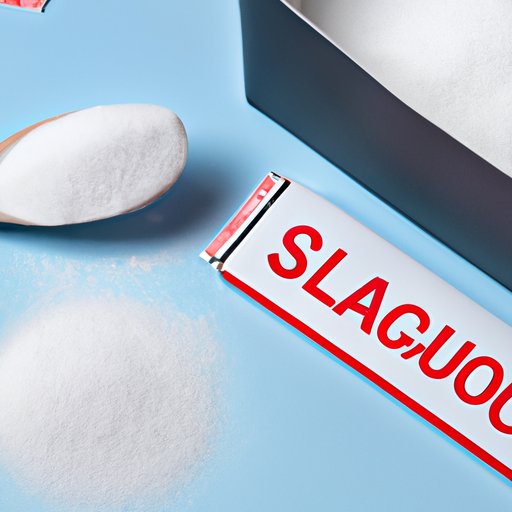
Introduction
In recent years, sucralose has become a popular low-calorie sweetener, touted as a healthier alternative to sugar. However, there is controversy over its impact on weight gain. Some claim that sucralose leads to weight gain, while others argue that it can help with weight loss. So, what’s the truth? In this article, we’ll explore the science behind sucralose’s impact on weight gain and provide some tips for making healthy choices when it comes to sweeteners and processed foods.
The Truth About Sucralose: Does it Actually Cause Weight Gain?
Sucralose is an artificial sweetener made from sugar that has been chemically modified. It is commonly used in a variety of foods and beverages, including soda, chewing gum, and baked goods.
So, does sucralose cause weight gain? According to scientific studies, the answer is no. While some animal studies have suggested a link between consuming artificial sweeteners and increased appetite and weight gain, the majority of human studies have found no significant correlation between sucralose consumption and weight gain.
It’s important to note that consuming sucralose in moderation is generally considered safe for most people. However, like any food or ingredient, excessive consumption may lead to health issues such as headaches or gastrointestinal problems.
Sucralose and Your Diet: What You Need to Know
When consumed regularly, sucralose can affect the body in a number of ways. Some studies have suggested that consuming artificial sweeteners can increase appetite and decrease metabolism, which may lead to weight gain. However, other studies have found no significant impact on appetite or metabolism.
Additionally, sucralose has been shown to have little to no effect on blood sugar levels, making it a popular sweetener for individuals with diabetes or those watching their blood sugar levels. However, it is important to note that consuming excessive amounts of foods and beverages sweetened with sucralose can still contribute to overall carbohydrate intake, which may impact blood sugar levels.
One potential benefit of consuming sucralose is that it can help reduce overall calorie intake, particularly in individuals who consume excessive amounts of sugar-sweetened foods and beverages. Switching to low-calorie alternatives, such as those sweetened with sucralose, can help individuals reduce their overall calorie intake and potentially contribute to weight loss.
Breaking Down the Myths About Sucralose and Weight Gain
There are many misconceptions about sucralose and its impact on weight gain. One common myth is that consuming artificial sweeteners increases cravings for sweet foods and leads to overeating. However, scientific studies have found no significant link between the consumption of artificial sweeteners and increased cravings or overeating.
Another myth is that consuming sucralose can lead to an increase in insulin production, which may lead to weight gain. However, studies have shown that sucralose has little to no effect on insulin levels.
Sucralose in Your Favorite Foods: Can it Contribute to Weight Gain?
Sucralose is commonly found in a variety of processed foods and beverages, such as diet soda, low-calorie snacks, and sugar-free desserts. While consuming these foods in moderation is generally considered safe, excessive consumption can contribute to overall calorie intake and potentially lead to weight gain.
One way to reduce your consumption of sucralose and other artificial sweeteners is to choose whole, unprocessed foods whenever possible. When purchasing packaged foods, take a look at the ingredients label and choose products that are lower in added sugars and artificial sweeteners.
How Sucralose Affects Your Body and What it Could Mean for Your Weight Loss Goals
Beyond its impact on weight, sucralose can affect the body in a number of ways. Some studies have suggested that consuming excessive amounts of sucralose may lead to digestive issues or headaches in some individuals. However, these side effects are generally considered rare.
If you are looking to lose weight while consuming sucralose, it’s important to focus on making healthy, sustainable changes to your diet and lifestyle. This may include reducing your overall calorie intake, increasing your consumption of nutrient-dense foods, and engaging in regular physical activity.
It’s also important to remember that weight loss is a complex process that can involve many factors beyond simply consuming or avoiding certain foods or ingredients. Working with a healthcare provider or registered dietitian can help you create a personalized plan for achieving your weight loss goals.
The Link Between Sucralose and Weight Gain: Separating Fact from Fiction
While there is some controversy surrounding the impact of sucralose on weight gain, the majority of scientific evidence suggests that it does not cause weight gain on its own. However, excessive consumption of foods and beverages sweetened with sucralose and other artificial sweeteners can contribute to overall calorie intake and potentially lead to weight gain over time.
If you are looking to make informed choices about your diet and weight loss goals, it’s important to focus on creating a balanced, nutritious diet that includes a variety of whole, unprocessed foods. Avoiding excessive consumption of artificial sweeteners, including sucralose, can be a part of this approach.
Conclusion
Overall, the evidence suggests that sucralose does not cause weight gain on its own. However, excessive consumption of foods and beverages sweetened with sucralose and other artificial sweeteners can contribute to overall calorie intake and potentially lead to weight gain over time.
If you are looking to make healthy choices about your diet and weight loss goals, focusing on whole, unprocessed foods and reducing your consumption of added sugars and artificial sweeteners can be a helpful approach.





